Daily Vocabulary Words: Enhance Your Lexicon with Leading Newspapers & Publications
Welcome to the Daily Vocabulary section at Wordpandit!
Our mission is straightforward: to bring you essential vocabulary words featured in top newspapers and publications worldwide. By focusing on words you’ll encounter in renowned sources, we aim to help you enhance your vocabulary effectively and practically.
Our selection includes words from:
– The New York Times
– The Washington Post
– Scientific American
– BBC
– The Guardian
– Psychology Today
– Wall Street Journal
– The Economist
– The Hindu
– The Times of India
– The Economic Times
– Hindustan Times
– Live Mint
– The Indian Express
– And many more.
We are committed to your vocabulary development. Simply visit this section regularly and explore the daily posts. This is your go-to repository for commonly used words, providing significant practical benefits by familiarizing you with vocabulary from the leading publications listed above.
Make it a habit to visit our website daily and expand your lexicon with words from top newspapers and publications.
WORD-1: CRATER
CONTEXT: The answer, I think, is this: Where there used to be a pinnacle, there’s now a crater.
SOURCE: The New York Times
EXPLANATORY PARAGRAPH: Imagine a giant bowl-shaped hole in the ground, like the ones on the moon. That hole is called a crater. It can be made when a big rock from space crashes into the ground or when a volcano explodes.
MEANING: A large, round hole in the ground or on a surface, usually made by an explosion or impact (noun).
PRONUNCIATION: KRAY-ter
SYNONYMS: Hollow, cavity, pit, depression, basin, indentation
USAGE EXAMPLES:
1. The astronauts saw many craters on the moon’s surface.
2. After the volcano erupted, a huge crater was left behind.
3. The impact of the meteor created a deep crater in the earth.
4. The playground had a small crater where the old tree used to be.
WORD-2: DETRACTORS
CONTEXT: Whenever it elevates someone like Gay, there’s an assumption by admirers and detractors alike that she’s a political symbol whose performance represents more than who she is as a person.
SOURCE: The New York Times
EXPLANATORY PARAGRAPH: Imagine you build a really cool tower of blocks, but some kids don’t like it and say it’s not good. Those kids are called detractors. They are people who criticize or speak against something you did.
MEANING: People who criticize or speak against someone or something (noun).
PRONUNCIATION: dih-TRAK-ters
SYNONYMS: Critics, naysayers, opponents, faultfinders, doubters, disapprovers
USAGE EXAMPLES:
1. Despite her detractors, she continued to work on her art.
2. The movie had many detractors who didn’t like the ending.
3. Detractors often focus on the negative aspects of any project.
4. He ignored his detractors and kept pursuing his dreams.
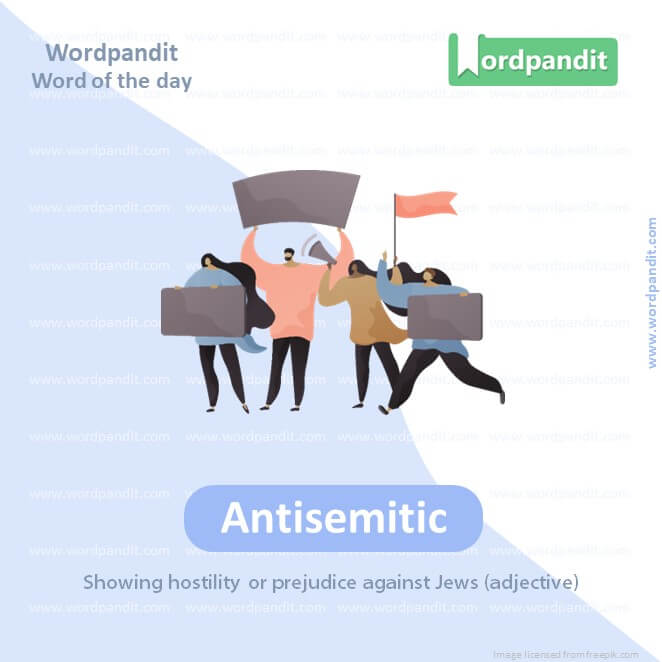
WORD-3: ANTISEMITIC
CONTEXT: Last year, the number had fallen to 36 percent, and that was before the wave of antisemitic campus outbursts. At Harvard, early admission applications fell by 17 percent last fall.
SOURCE: The New York Times
EXPLANATORY PARAGRAPH: Imagine someone who doesn’t like a group of people just because they belong to a certain religion. If they don’t like Jewish people just because they’re Jewish, that’s called being antisemitic, which is very wrong.
MEANING: Showing hostility or prejudice against Jews (adjective)
PRONUNCIATION: an-ti-suh-MIT-ik
SYNONYMS: Prejudiced, bigoted, discriminatory, biased, hateful, intolerant
USAGE EXAMPLES:
1. Antisemitic remarks are harmful and unacceptable in any society.
2. The museum displayed artifacts showing the history of antisemitic behavior.
3. Schools teach children why antisemitic actions are wrong.
4. She spoke out against antisemitic comments made in her community.
WORD-4: REACTIONARY
CONTEXT: It seemed to click into place then that Mr. Trump’s fluid plans, reactionary ideas, jokes and lies could coexist with and shape grave events.
SOURCE: The New York Times
EXPLANATORY PARAGRAPH: Imagine if you don’t like change and want things to stay the same as they were long ago, like how your grandparents lived. If you strongly believe that, you might be called reactionary.
MEANING: Opposed to change or wanting to return to how things were in the past (adjective).
PRONUNCIATION: ree-AK-shuh-ner-ee
SYNONYMS: Conservative, traditionalist, right-wing, backward-looking, old-fashioned, resistant
USAGE EXAMPLES:
1. His reactionary views made him resist any new ideas in the company.
2. The reactionary group wanted to bring back old laws and traditions.
3. She held reactionary beliefs about technology and its impact on society.
4. The reactionary policies were unpopular with younger generations.
WORD-5: SWOONED
CONTEXT: In 2015 and 2016, as he was becoming the Republican nominee the first time, Mr. Trump quickly transformed into an all-encompassing, central figure, in an evolving, building story that started like a dark joke that Mr. Trump was in on, then swooned into a reality.
SOURCE: The New York Times
EXPLANATORY PARAGRAPH: Imagine seeing something so amazing or someone so special that you feel dizzy and almost fall down. That’s what it means to swoon – to feel so excited or in love that you nearly faint!
MEANING: To feel so much emotion that you almost faint or become overwhelmed (verb).
PRONUNCIATION: swoond
SYNONYMS: Fainted, collapsed, passed out, wilted, fell, weakened
USAGE EXAMPLES:
1. She swooned when she saw her favorite singer on stage.
2. The crowd swooned as the handsome actor walked by.
3. He nearly swooned at the sight of the beautiful painting.
4. The fans swooned over the new movie trailer.
WORD-6: VERMIN
CONTEXT: That delusion is no longer available. When Trump promises to expunge the “radical left thugs that live like vermin within the confines of our country”, it is a safe bet that he intends to follow through. If returned to the White House he would use every executive lever to eliminate restraint on his power.
SOURCE: The Guardian
EXPLANATORY PARAGRAPH: Imagine tiny, pesky creatures like rats or bugs that can cause trouble and make places dirty. These annoying little animals are called vermin.
MEANING: Small animals or insects that are harmful and difficult to get rid of (noun).
PRONUNCIATION: VUR-min
SYNONYMS: Pests, rodents, insects, parasites, nuisances, critters
USAGE EXAMPLES:
1. The old barn was infested with vermin like rats and mice.
2. Farmers often struggle to keep vermin away from their crops.
3. The city worked hard to reduce vermin in the crowded areas.
4. Vermin can spread diseases if they are not controlled.
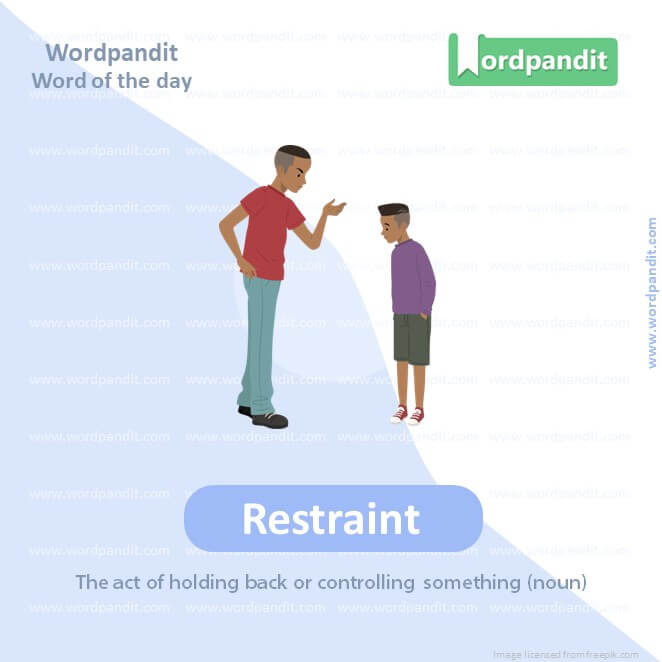
WORD-7: RESTRAINT
CONTEXT: That delusion is no longer available. When Trump promises to expunge the “radical left thugs that live like vermin within the confines of our country”, it is a safe bet that he intends to follow through. If returned to the White House he would use every executive lever to eliminate restraint on his power.
SOURCE: The Guardian
EXPLANATORY PARAGRAPH: Imagine wanting to eat a whole cake, but you stop yourself after one piece. That’s called showing restraint – when you control your actions or feelings even when you want something really bad.
MEANING: The act of holding back or controlling something (noun)
PRONUNCIATION: reh-STREYNT
SYNONYMS: Self-control, moderation, discipline, reserve, limitation, restriction
USAGE EXAMPLES:
1. She showed great restraint by not responding to the rude comment.
2. The dog needed restraint to stop it from running into the street.
3. Exercising restraint can be difficult when faced with temptation.
4. The judge urged restraint during the heated courtroom discussion.
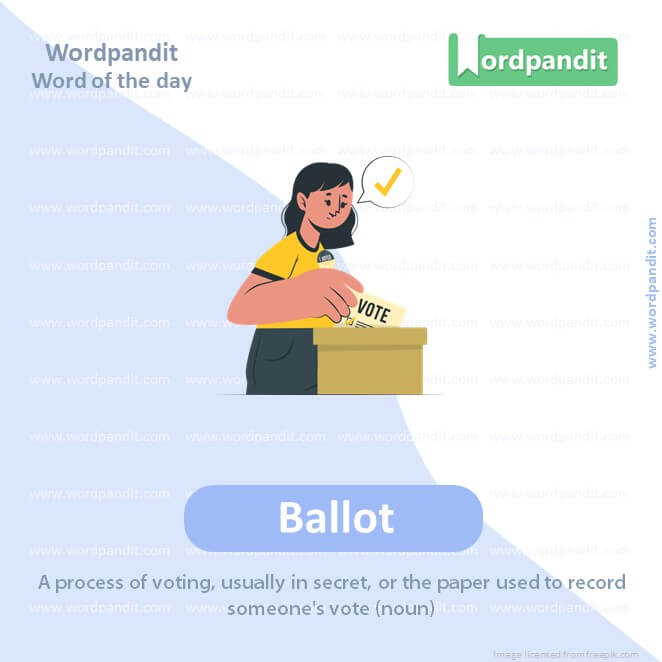
WORD-8: BALLOT
CONTEXT: That is why he is facing multiple criminal charges and has been disbarred from even appearing on the ballot in two states (although the ban could be overturned by the supreme court).
SOURCE: The Guardian
EXPLANATORY PARAGRAPH: Imagine getting a piece of paper where you can choose who should be the class leader. That paper is called a ballot. It’s what people use to vote and make decisions.
MEANING: A process of voting, usually in secret, or the paper used to record someone’s vote (noun)
PRONUNCIATION: BAL-ut
SYNONYMS: Vote, poll, election, referendum, selection, choice
USAGE EXAMPLES:
1. She cast her ballot for the new mayor.
2. The ballot included several candidates for the school board.
3. Every citizen has the right to fill out a ballot and vote.
4. The ballot results were announced at the end of the day.
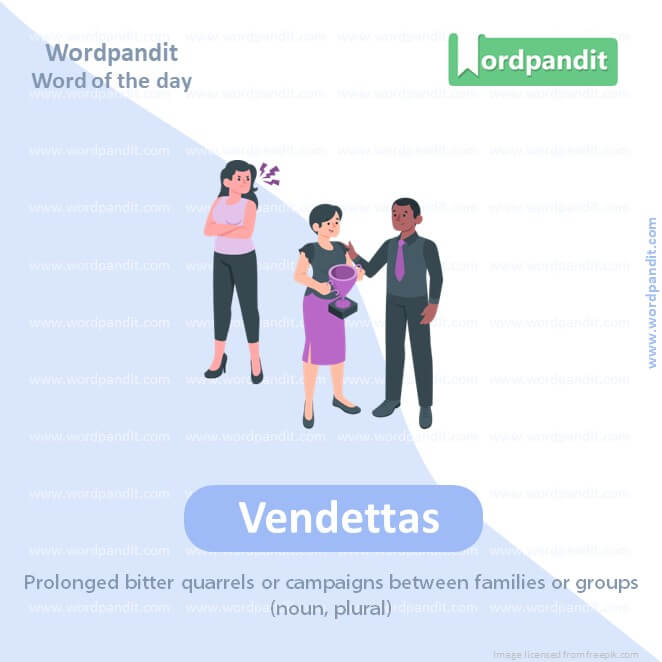
WORD-9: VENDETTAS
CONTEXT: He would requisition the justice system to entrench his position and pursue vendettas against all who crossed him. He would find no shortage of appeasers and accomplices.
SOURCE: The Guardian
EXPLANATORY PARAGRAPH: Imagine someone who is really, really angry at another person for a long time and wants to get back at them no matter what. That long, strong feeling of revenge is called a vendetta.
MEANING: Prolonged bitter quarrels or campaigns between families or groups (noun, plural)
PRONUNCIATION: ven-DET-uhs
SYNONYMS: Feuds, grudges, conflicts, rivalries, hostilities, disputes
USAGE EXAMPLES:
1. The families had been locked in vendettas for generations.
2. He carried a personal vendetta against his former boss.
3. Vendettas often lead to more harm than good.
4. The movie was about a hero trying to end a dangerous vendetta.
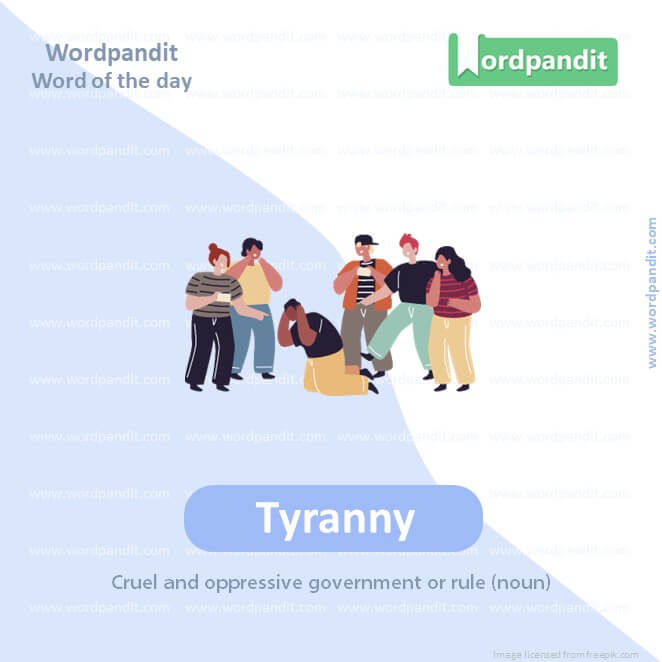
WORD-10: TYRANNY
CONTEXT: This is how tyranny makes itself electable: it is branded as the avenging arm of freedom.
SOURCE: The Guardian
EXPLANATORY PARAGRAPH: Imagine someone who is very mean and makes all the rules, never letting anyone else have a say. That person is acting with tyranny, which means using power in a very unfair and cruel way.
MEANING: Cruel and oppressive government or rule (noun)
PRONUNCIATION: TEER-uh-nee
SYNONYMS: Oppression, dictatorship, authoritarianism, despotism, autocracy, domination
USAGE EXAMPLES:
1. The people fought against the tyranny of the cruel ruler.
2. Tyranny often leads to rebellions and uprisings.
3. History is filled with examples of tyranny that led to change.
4. The book told the story of a country freed from tyranny.
Vocabulary 100 Words
Diving into the exciting waters of language learning, encountering a list of ‘vocabulary 100 words’ is a common step. These lists, often tailored to specific proficiency levels or topics, present microcosms of the language, cradling essential words that broaden our linguistic comprehension. However, to effectively grasp ‘vocabulary 100 words’, a well-crafted strategy is imperative.
The cornerstone of learning any ‘vocabulary 100 words’ lies in understanding each word with depth. This involves more than just registering the meaning. It extends to understanding its use in different contexts, its nuances, and its connotations.
When navigating ‘vocabulary 100 words’, pacing is extremely important. Rather than trying to absorb all the words at once, a steady approach of learning a few words every day promotes better retention. This assures your brain is not overwhelmed with information, resulting in more effective learning.
Interactivity adds a significant boost while engaging with ‘vocabulary 100 words’. Employ tools like flashcards or digital language-learning apps to make your learning experience more engaging. Regular tests or quizzes provided by these platforms can be beneficial in gauging your progress and identifying areas that need additional work.
Real-world usage significantly enriches understanding of ‘vocabulary 100 words’. Incorporate the words into your daily conversations, writing, or social media interactions. This practice element not only empowers retention but also bolsters your confidence in using these words correctly.
In conclusion, mastering ‘vocabulary 100 words’ is an enriching journey that calls for systematic learning, paced approach, engaging tools, and practical application. As you venture down this path, you’ll find the ‘vocabulary 100 words’ transforming from daunting lists into friendly allies, accompanying you on your thrilling linguistic exploration.











